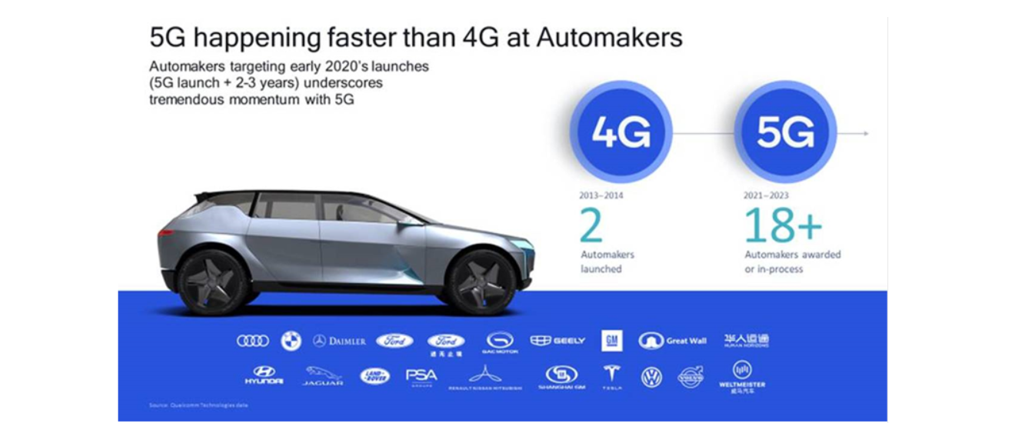
The adoption of 5G technology in the automotive industry is proceeding quietly but rapidly. Indications are that 18 car makers from around the world have committed to the deployment of 5G connectivity but have largely done so without bold public statements.
The reason for this swift embrace of 5G has many dimensions, some of which were reflected in the Qualcomm keynote delivered by Alex Rogers, executive vice president of Qualcomm Technology Licensing at the recent “Beyond the Mobile Phone: Leveraging 5G for Automotive” event at Eurecom. For the first time, Rogers noted, the automotive and telecom industries have collaborated on a set of global standards intended to smooth the path of automotive adoption of this latest wireless network technology.
Inherent in the standards setting process has been the recognition and integration of a wide range of intellectual property supporting the deployment of new, industry-altering applications and network capabilities. Connected cars will benefit from and be transformed by cellular connectivity in ways that will enable new revenue-creating business models while saving lives, and reducing congestion and vehicle emissions.
Nowhere is this collaboration more evident than in the multiple European projects for creating cross-border connected automated driving corridors for testing various 5G applications. The Europe-wide scope of the effort which is matched by similar though not as expansive efforts elsewhere in the world speaks to the recognition that 5G will alter the nature of connected driving.
Says Rogers: “With 5G cellular vehicle-to-everything connectivity – or 5G V2X – cars will be able to communicate directly with other vehicles, pedestrians, and infrastructure to exchange real-time information about road and traffic conditions.
“Cars will be able to share intent, trajectory, and location for more predictable and coordinated autonomous driving – saving time and energy… and reducing crashes and fatalities.
“5G will also enable new in-vehicle experiences for passengers and drivers that are richer and more engaging.
“The fact that the power of 5G connectivity is available to the European automotive industry should not be taken for granted.”
Rogers attributes the successful deployment of 5G to the coordinated standards-setting activities of multiple parties in multiple geographies and to the availability of consistent technology licensing strategies that have facilitated the appropriate compensation of technology creators. Together, technology creators and technology users are bringing new connected car capabilities to market.
The rapid uptake of 5G technology by auto makers reflects the record setting pace of 5G implementation by wireless carriers. Data from Strategy Analytics reveals the pace of 5G deployment by carriers is unprecedented.
For auto makers, 5G brings a lower latency, higher capacity network to the task of connecting vehicles simultaneously adding dedicated capabilities in the form of network slicing and inherent network intuition in the form of predictive quality of service. Together, these elements of 5G are paving a path forward for the integration of wireless cellular technology with safety systems for avoiding collisions and enabling automated driving solutions.
Rogers did express some words of concern regarding the licensing of 5G tech. “It would be unfortunate if… just as Europe rallies around building and rebuilding technology sovereignty in various areas such as semiconductors… it allows existing and extremely valuable technology competence and innovation in mobile to be undermined and eroded.
“As we have discussed in many other forums – and as we will continue to urge – we need to find a reasonable industry solution to licensing essential cellular technology in the automotive space. I believe we can,” he said.
Indeed, the time has arrived for auto makers and IP creators to resolve pending licensing issues as cellular 5G technology begins to redefine the driving experience and transform the economic implications of car connectivity. It would be a shame if unresolved issues were to impede the incredible progress already achieved.








Moore’s Law Wiki